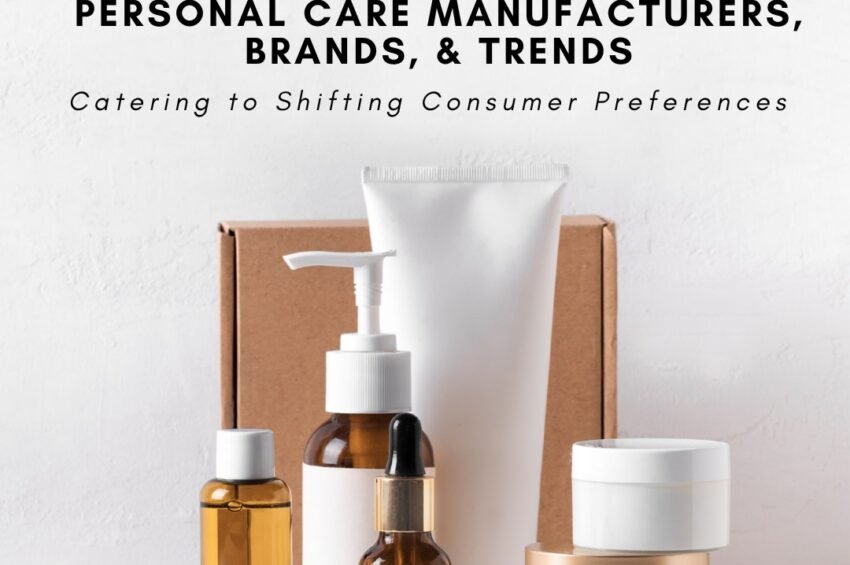Personal Care Manufacturers, Brands, & Trends: Catering to Shifting Consumer Preferences
Personal care products have become integral to our daily routines, offering various benefits for our skin, hair, and overall well-being. As per a Statista report, an Indian spends an average of Rs. 700+ on cosmetics and personal care products, which covers about 7-9 products by an individual. This number is a notable increase from when personal care products were less in demand or use. Many personal care products are available, from cleansing to hair and skin care. Behind the scenes, personal care manufacturers play a crucial role in developing and producing these products to meet consumers’ growing demands.
Rise and expansion of the Personal Care Manufacturers, Brands:
The personal care industry has witnessed significant domestic and international expansion recently. The Indian beauty and retail market, particularly, has experienced a surge in newer products driven by Western trends and the rise of Indian entrepreneurs and start-ups. This growth can be attributed to several factors, including increased awareness, the inflow of beauty trends and practices from different cultures, shifting consumer preferences, and higher disposable incomes.
The global skincare market has been on a steady rise, with a valuation of $134.8 billion in 2018. It is projected to grow at a compound annual growth rate (CAGR) of 4.4 percent until 2025. These figures indicate the rapid expansion and immense potential of the cosmetics market. These figures have also played a crucial role in inviting more and more brands to emerge in the market, and as a result, increase in the number of personal care product manufacturers.
Shifts in Personal Care Industry:
One notable shift in consumer preferences is the growing demand for naturally-derived ingredients in personal care products. Consumers increasingly favor products that deliver the antioxidant benefits of foods and botanicals while being gentle on the skin. The fallout from the global pandemic has also prompted shoppers to consider ethically sourced, packaged, and manufactured goods. As a result, the market for natural and organic cosmetics is expected to reach $22 billion by 2024. Modern consumers, empowered by digital technologies, are now environmentally conscious and selective about the brands they support. These preferences have led to numerous brands emerging with trends that promote personal care products to be toxin-free, plant-derived, natural, and safe.
Today’s consumers are also more knowledgeable about the products they purchase, paying closer attention to a product’s purpose and target audience. Informed consumers prefer products that adhere to scientific principles. Furthermore, personal care product manufacturers have expanded their ranges to cater to this broader audience. They now offer everything from face cleansers, serums, and moisturizers to under-eye creams, face masks, sunscreen, and even makeup-centric skincare for women and men, with claims and certifications per trends. These products come in various options, each with reworked packaging and marketing strategies to appeal to a younger demographic.
Changing consumer expectations among rise in the industry:
Consumers’ increased sensitivity towards product quality and brand reputation has also played a significant role. Today, it is not just about the product; consumers also consider the company’s history. Healthy and environmentally friendly alternatives that offer affordability have become a top priority.
Cosmetic products are expected to serve dual purposes as skincare products. According to a recent Mintel report, hybrid cosmetics with skincare benefits are a growing category in the beauty industry and are set to explode in the coming year.
Emerging concepts in the Personal Care Industry:
Consumers are more detail-oriented, inclusive, sensitive, and socially aware with increasing awareness and knowledge. The growing concept of non-binary gender classification has also impacted the cosmetics industry. Many brands have embraced gender-neutral product lines to be more supportive and inclusive. There is a growing trend of unisex products that cater to the needs of both sexes, replacing the once-popular practice of marketing products exclusively to a specific gender.
While the global pandemic has slowed the cosmetics industry’s growth, the rise of digital and manufacturing sectors has fueled the demand for cosmetic products beyond metropolitan and other urban areas. With the rapid growth of e-commerce, numerous innovative companies have emerged to meet consumer demands.
Indian Personal Care Industry- In times of digitalization:
According to EuroMonitor International, India’s personal care market experienced a boom before the pandemic, with projected annual growth of 9.7 percent between 2018 and 2023. Consumer preferences have shifted significantly over the past two years, with a growing preference for online shopping.
The success of personal care product manufacturers relies on their ability to provide dynamic, in-demand products, custom services, trending, up-to-date ingredients, and quality products and services.
To remain competitive and achieve economies of scale, brands work to quickly adapt to changing consumer expectations and behaviors. Effective responses to the evolving market are, therefore, vital. Expanding consumer-friendly e-commerce options, such as websites, social media platforms, and influencers for showcasing and advertising personal care products, significantly benefit businesses. The digitization of customer approach channels enables the acquisition of new customers and the provision of a seamless customer journey for existing ones.
In conclusion, personal care manufacturers are crucial in meeting consumers’ diverse needs and preferences. The industry has experienced substantial growth, driven by shifting consumer preferences, increased product knowledge, and the rise of online shopping. With a focus on natural, herbal, and effective ingredients, personalized experiences, and inclusivity, the personal care industry is poised for further expansion and innovation in the years to come.

